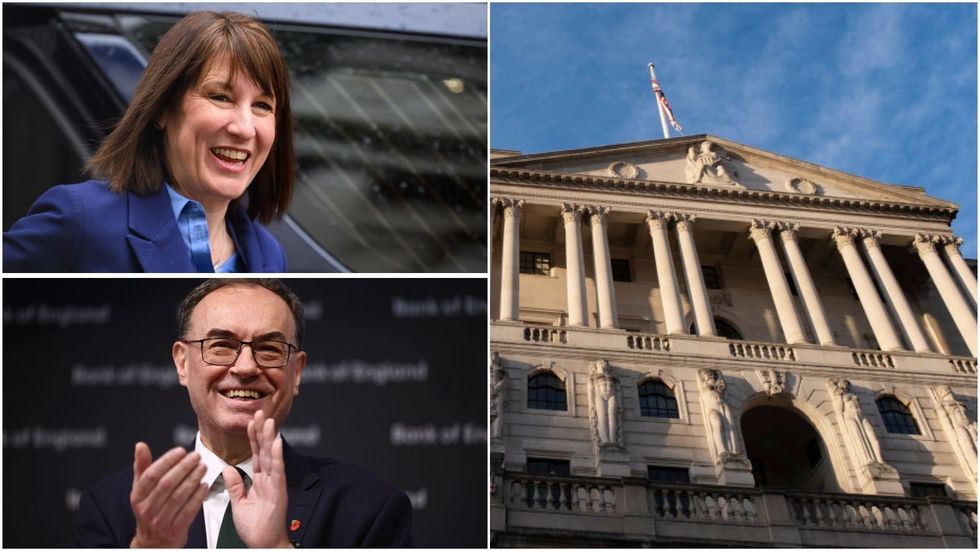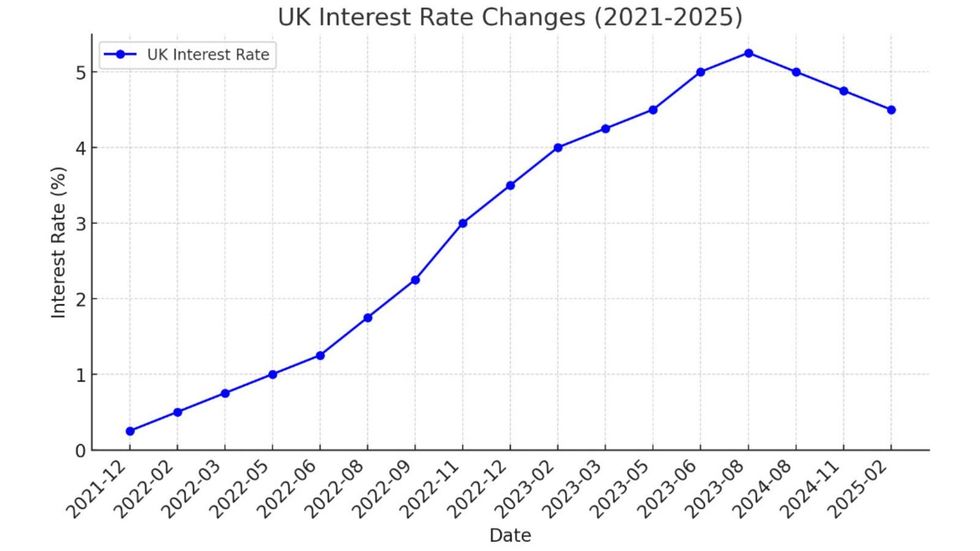Bank of England confirms interest rate cut to LOWEST LEVEL in 18 months in boon for Britons
'We have to kick start the economy!' Matthew Pennycook defends housing plans
Following today's MPC meeting, the Bank of England policymakers have cut the base rate to 4.5 per cent
Don't Miss
Most Read
Trending on GB News
The Bank of England has confirmed the UK's base rate is being cut from 4.75 per cent to 4.5 per cent, its lowest level in 18 months, in a boon for mortgage holders and debt borrowers across the country.
Earlier today, the central bank's Monetary Policy Committee (MPC) voted to slash interest rates by a majority of seven-to-two despite inflation remaining higher than the financial institution's desired two per cent target.
Bank of England Governor Andrew Bailey has previously emphasised caution when it comes to implementing reductions with the base rate having been held at 4.75 for multiple months.
This latest move from the central bank represents a win for Rachel Reeves who has come under pressure to cut Government spending or raise taxes in light of her fiscal headroom "evaporating".
However, the Bank of England also slashed its growth forecast for 2025, lowering the prediction from 1.5 per cent to 0.75 per cent.
Reacting to the MPC's vote, the Chancellor said: "This interest rate cut is welcome news, helping ease the cost of living pressures felt by families across the country and making it easier for businesses to borrow to grow. However, I am still not satisfied with the growth rate."
Following the Covid-19 pandemic, the Bank has raised interest rates, reaching a height of 5.25 per cent, in its ongoing fight against a soaring consumer price index (CPI) rate.
Do you have a money story you’d like to share? Get in touch by emailing money@gbnews.uk.

The central bank's MPC has voted to slash the base rate to 4.5 per cent
GETTY / PA
Borrowers, including those with debt and mortgage repayments, have been saddled with hiked costs as a result of this decision-making, however, savers have benefited from bolstered returns.
Analysts are pricing multiple base rate cuts from the Bank of England in 2025 but some have warned lackluster economic growth and US President Donald Trump's threat of tariffs could jeopardise future reductions.
Furthermore, analysts have cited the impact of Chancellor Rachel Reeves's Autumn Budget last year which has been criticised by many in the private sector for targeting business owners.
During her fiscal statement, the Chancellor confirmed Labour's plan to hike the National Living Wage and the rate paid in National Insurance contributions for employers.
LATEST DEVELOPMENTS:

The Bank of England base rate has fallen from the heights of 5.25 per cent seen following the pandemic
CHATGPT
Alastair Douglas, the CEO of Totally Money, warned that today's base rate cut will "unlikely make a real difference" and called on the Chancellor to "win over" consumers as soon as possible.
He explained: "Following a sustained period of rising costs and higher interest rates, a 0.25 per cent cut is unlikely to make a real material difference on people’s finances. Most mortgage lenders will have already factored this into their pricing, while some banks have already started reducing savings rates.
"Energy, water, phone, and broadband bills continue to rise, while Council tax in some areas will see a 10 per cent hike this April. People’s spending power is being reduced, while businesses are seeing their operating costs rise along with their National Insurance Contributions.
"We need to see a balanced approach which supports the economy in the long term, while kick-starting things now.
"Consumers need confidence in the people leading the country, and the government needs to win them over sooner, rather than later."
Ahead of today's announcement, Hetal Mehta, the head of Economic Research at St. James’s Place, said: "Wage growth may be sticky, and surveys show price expectations have firmed in recent months but a variety of indicators are showing employment strains, complicating the policy stance.
"As such, it shouldn’t come as a surprise that the MPC will be most likely be split – even three ways.
"In the coming months and in the medium term, the BoE will have to monitor closely how the price signals manifest themselves in the data.
 Most countries have been forced to contend with rising interest rates following the Covid-19 pandemic GETTY
Most countries have been forced to contend with rising interest rates following the Covid-19 pandemic GETTY "High inflation risks the second-round effects being stronger; the pass-through from the National Insurance tax increases are likely to also keep the MPC cautious and only on a gradual cutting path.
“The news of tariffs levied by the US against Canada, Mexico and China will inevitably raise questions on how central banks - especially the ECB but also the BoE – should respond should they also be subject to such protectionist measures.
"It is too late for the BoE to adjust its forecasts and assumptions for global growth, but any further weakness in the euro area economy will likely spillover to the UK. For some MPC members, the case for a pre-emptive cut may be enhanced.
"One other point of interest in the Monetary Policy Report will be the Bank’s refreshed assessment of the supply side of the economy. Typically, the BoE and OBR have had very different views on potential growth, with the Bank being far more pessimistic."







